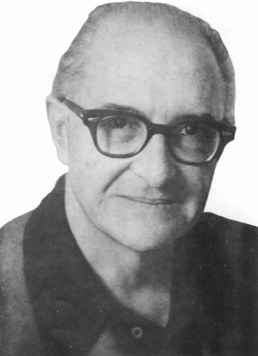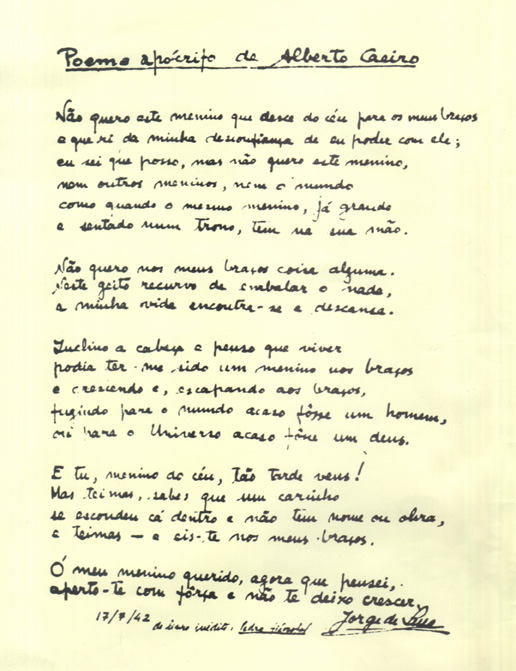

Macau celebrated the tenth anniversary of Jorge de Sena's death. In line with the policy of promoting Portuguese culture in the Chinese community, the National Library organized a Bibliographic Exhibition which featured a bilingual brochure (Portuguese and Chinese) composed of a biographic preface and 229 bibliographic entries covering poetry, theatre, fiction, cultural and literary critics, correspondence, prefaces, translations, the author's bibliography and other bibliographical works.
The introduction, written by the head of the library, Mr. Jorge Arrimar, and translated into Chinese, stated the following:
'This year marks the tenth anniversary of the death of Jorge de Sena, a renowned essayist, playwright, novelist, literary critic and poet. His is a vast work and covers, in his capacity as essayist and scholar, several periods of Portuguese, Brazilian, English and American literature. He also taught Portuguese Literature after he graduated in 1964.

Jorge Cândido de Sena was born on the 2nd of November 1912 in Lisbon. He graduated in Civil Engineering from Oporto University in 1944. He went into voluntary exile in Brazil in 1959 where he became Professor of the Theory of Literature at the Assis Faculty of Philosophy, Sciences and Arts, in the State of S. Paulo. Two years later, in 1961, he became Professor of Portuguese Literature at the Araquara Faculty of Philosophy, Sciences and Arts. In 1965 he decided to leave for the United States. Prior to that, he took a post-graduate degree in Arts and Free-teaching of Portuguese Literature with the following theme: "The Camões sonnets and the peninsular sonnet of the 15th century." As he had become a Brazilian national, he went into a second voluntary exile in the United States to teach at Wisconsin University. There he conducted advanced courses of Portuguese and Brazilian literature. In 1967, he became Professor of the Portuguese and Spanish Department in the same University. He moved to Santa Barbara (California) in 1970 as Professor of the Spanish and Portuguese Department and Head of Comparative Literature. He held those posts until he passed away on the 4th of June 1978.
Jorge de Sena's poetry was written between 1936 and 1978 and comprises six volumes. His first book entitled Perseguição, 1942, is about poetry. Other books such as Coroa da Terra (1946), Pedra Filosofal (1950), Fidelidade (1958), Metamorfoses (1963), Arte de Música :1968), Peregrinatio ad Loca Infecta (1969, Exorcismos (1972), Conheço o Sal... (1974) and Sobre Esta Praia (1977), not including his posthumous volumes, are examples of coherent and diverse poetry. Sena's poetry features a highly conceptual density. It is intellectualized and has a discursive structure which spans throughout quite long periods. In general, Sena's poetic work, even in the early years, has always been linked to a complex and diverse dialogue that is only possible thanks to a very brilliant and cultured mind. Sena's poetry is based on various cultural and social themes which range from plastic arts to music, touching areas such as human poverty and social-political concerns of the Neo-Realist period.
In addition to his work as a playwright with a very important tragedy entitled O Indesejado (1949-1950), Jorge de Sena left us tales such as Andanças do Demónio (1960), Novas Andanças do Demónio (1966), Os Grão-Capitães (1975), one of the most interesting novels of Portuguese contemporary literature entitled O Físico Prodigioso (1977) and a romance entitled Sinais de Fogo (1979).
He was also a very prolific critic of literature, theatre and art.
Jorge de Sena is one of the most important writers in the Portuguese language and as such, this exhibition meets ICM's aim which is to promote the most important figures of Portuguese culture within this region. The Macau National Library is then proud to present this Bibliographic Exhibition which displays some of Jorge de Sena's works, even though only the oldest publications are referred to in the brochure.
In order to provide the reader with references of works by and about Jorge de Sena, at the end of the brochure we present all bibliographic entries that we managed to find although some of them cannot be found in the Macau National Library."
Jorge de Sena's widow, Mrs. Maria Mécia de Freitas Lopes came to Macau for the exhibition. At the end of the opening ceremony, Mrs. Maria Lopes made a speech about Jorge de Sena's work and history. Her role in protecting and promoting work which is yet to be fully acknowledged, published and promoted in Portugal was one of the most important messages in the speech. Maria Lopes drew the audience's attention and interest to some of the author's lesser known facets.
To celebrate the occasion, RC is publishing two of the works on display: two original manuscripts of poems by Jorge de Sena entitled Ode a Ricardo Reis and Poema apócrifo de Alberto Caeiro.
Translated by José Vieira

start p. 109
end p.